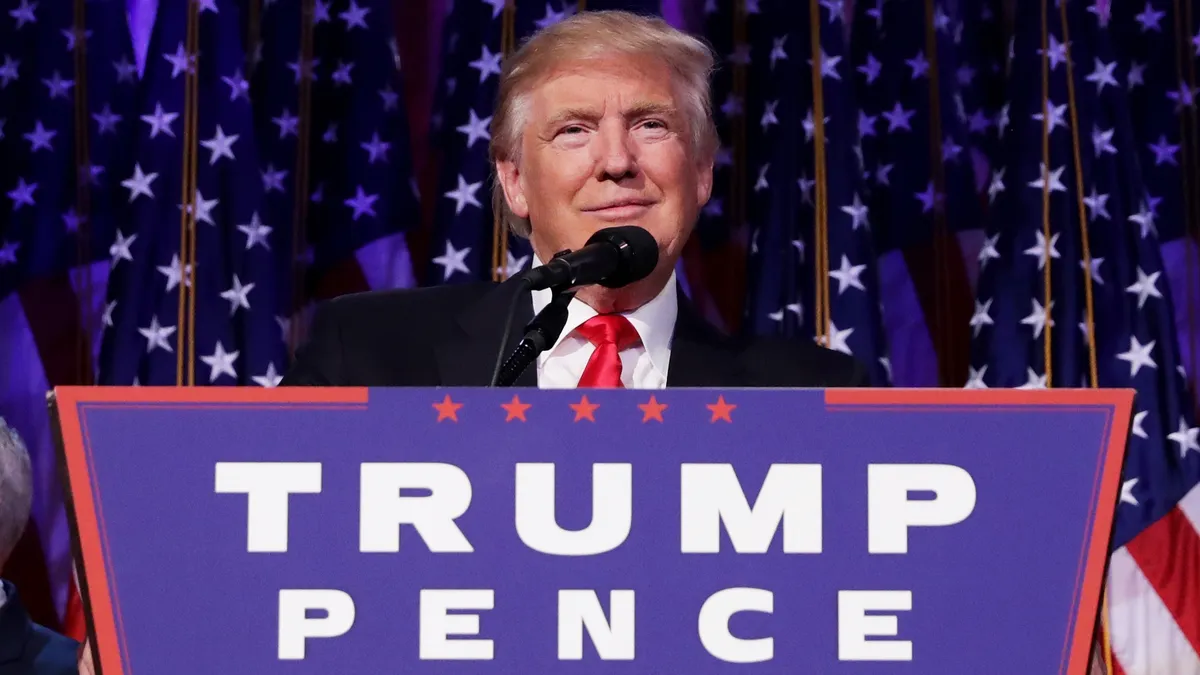Dive Brief:
- The Trump administration will attempt to roll back the Clean Power Plan without providing a replacement regulation for carbon emissions from the power sector, an anonymous source briefed on the issue told Climatewire.
- Executive orders, originally planned for this week but now delayed until next week, will reportedly direct the EPA to "revise or rescind" the regulation and instruct the Department of Justice to halt its defense of the rule, currently under consideration by the D.C. Circuit Court.
- Though the administration reportedly will not issue a new regulation and wants to repeal the rule without replacement, it remains unclear whether the EPA will seek to eliminate carbon regulations on the power sector completely or scale the Clean Power Plan back to a less stringent rule.
Dive Insight:
Climatewire's report suggests the Trump administration will not seek to replace the Clean Power Plan with a new carbon regulation.
The report reveals an internal desire in the White House to eliminate the carbon regulation, but it remains unclear whether the administration will wipe all greenhouse gas regulations off the books or simply scale back the CPP to a more modest regulatory package.
The orders reportedly instruct the EPA to "revise or rescind" the Obama administration's carbon regulations, ultimately leaving the final decision to the agency.
The orders also reportedly direct the DOJ to stop defending the CPP in court, requesting that the D.C. Circuit drop the case before rendering an opinion this spring. The judges will ultimately decide whether to issue a decision on the case. If a decision is issued, supportive states and environmental groups could step in to defend the CPP in a probable appeal to the Supreme Court
For months, many power sector observers have expected the agency to choose the "revise" route, downsizing the CPP to a narrower regulatory package that would require only small efficiency improvements to existing plants. New EPA Administrator Scott Pruitt wrote such an alternative plan in 2014.
A plan like that would likely be subject to legal challenges asserting it is not sufficient to combat climate change. But energy lawyers say the "revise" route would be an easier choice than an outright repeal of the rules, which would raise questions about whether the EPA is satisfying legal obligations to regulate greenhouse gas pollution.
In 2007, the Supreme Court ruled in Massachusetts v. EPA that the EPA has the authority to regulate carbon dioxide and other greenhouse gas emissions if the agency determines they are a threat to public health. The agency determined they are indeed a threat in a 2009 endangerment finding and thereafter began to draw up a series of regulations, including the Clean Power Plan.
If the CPP is withdrawn and not replaced, liberal states and environmental groups would likely sue the agency on the grounds that it is still under that obligation.
The Trump administration could respond in a variety of ways, including arguing that the EPA cannot regulate coal plants under two parts of the Clean Air Act simultaneously. The agency's Mercury and Air Toxics Standards, promulgated in 2012, limit pollution under section 112 of the law, while the CPP and standards for new plants are regulated under section 111. The "double regulation" issue was a key point raised by petitioners in arguments against the CPP at the D.C. Circuit Court in September.
The administration could also seek to challenge the 2009 endangerment finding — an uphill battle, energy lawyers say, because it would have to prove in court that GHGs are not a public health threat. Pruitt has shown appetite for the fight before, however, signing onto a legal challenge to the finding in 2012.
In his confirmation hearing, Pruitt said he accepted the agency's authority to regulate carbon, but the reported content of the executive orders as well as earlier comments suggest his stance may be different. In a Wall Street Journal interview shortly after his confirmation, Pruitt said he was unsure whether the EPA has the "tools" to regulate carbon from the power sector, suggesting legislative changes to the Clean Air Act would be needed to give it the proper authority.
Rescinding the Clean Power Plan would require a lengthy rulemaking process, Climatewire notes. At this point, it remains unclear whether the administration will stop there or challenge the endangerment finding outright, which would significantly impact the ability of future administrations to regulate carbon.
"That's the interesting question," Matthew Larson, a partner at Wilkinson Barker Knauer, LLP, told Utility Dive. "Is this just the first step, and the ultimate attempt is to go back and unwind the endangerment finding?"














